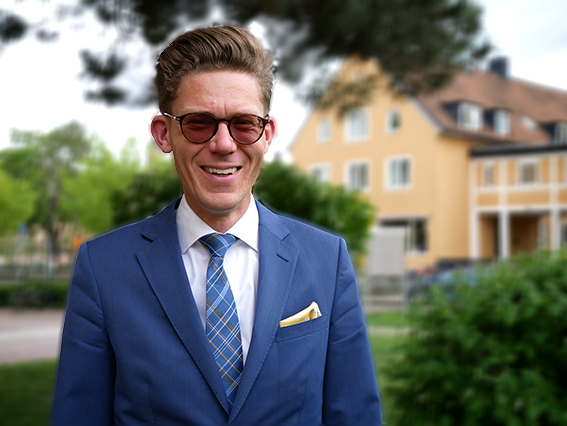In his latest research, Jonatan Schytzer starts with a high-profile environmental problem

Jonatan Schytzer
Jonatan Schytzer is a new senior lecturer in civil law at the Faculty of Law and was named Teacher of the Year 2021 by the law students. He defended his award-winning dissertation, The Origin of Claims in Insolvency Law in February 2021 and in April 2022 began his new research project "The Environment in Bankruptcy", which the Torsten Söderberg Foundation has funded.
"In my new project, I am starting with a societal problem, namely that in recent years we have repeatedly been made aware in the media of how criminal actors have shot themselves at the expense of the environment. The criminal gangs are committed to taking care of waste, but instead of complying with current regulations, black mass from ground batteries has been buried in fields outside Kumla, toxic waste has been evicted near water sources on the shores of Lake Mälaren and waste has been handled so poorly that hard-to-extinguish fires have broken out at waste facilities in southern Stockholm and in Småland. Poison masses have become a commodity in the underworld. We can talk about waste gangsters", says Jonathan.
There is an extensive regulatory framework on how, among other things, waste should be taken care of. The rules are based on the polluter paying, but in the vast majority of the cases mentioned, there is no money in the criminals or in the activities they carry out. The companies have been declared bankrupt, which in the long run short-circuits the environmental legal system based on the fact that it is the polluter who must pay. In these cases, there is a lack of sufficient funds to remediate the environment. One could thus say that the environment has been declared bankrupt.
How this social problem is to be solved is something I will research in the project, says Jonatan. Specifically, I will examine three issues, namely:
- Under what legal conditions are environmental claims in a bankruptcy reimbursed?
- Under what legal conditions should environmental claims be replaced in bankruptcy and how can bankruptcy law be changed to reduce the risk of situations arising when polluters cannot pay?
- What changes at the principle level can be implemented by the justice system to reduce the risk of situations when polluters cannot pay?
The latter two questions are of a de lege ferenda nature, that is, they are about how the right should be, rather than what the right is like. In this part, it is important to get inspiration from other areas of law and legal orders. At this stage of the project, Jonathan presented the project in Dublin at the INSOL Europe Academic Conference and received many good views from researchers from different countries in Europe that he will continue to work.
"I have also been in contact with researchers in Canada and received information on how to solve these issues, as well as discussed the project in Bergen. On June 3 -22, I will present the project at the Stockholm Centre for Commercial Law at Stockholm University. Then the former president of the Supreme Court, Stefan Lindskog, will be the commentator and I am convinced that I will get good input. On June 8, I will also present the project, but then in the home environment, that is, at the Faculty of Law in Uppsala."
- After the dissertation, I have also had a collaboration with JUR. Mikael Ek, who has a PhD at the Faculty of Law in Uppsala but who is now active at the University of Gävle.We have examined the technically difficult issues of the status of VAT claims in bankruptcy. And we are now working on an article on the status of VAT claims in corporate reconstruction. These are important questions, among other things, because the Swedish Tax Agency has come up with new positions that have made the public chord in a company reconstruction up to 60% more expensive. This makes a company reconstruction impossible in many cases, concludes Jonatan.
